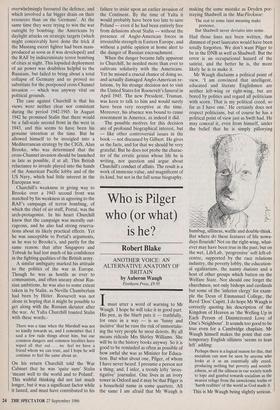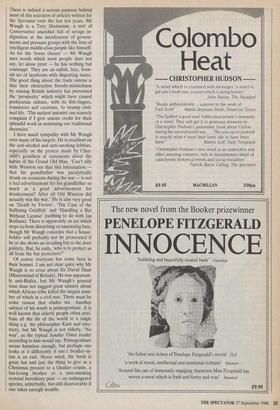Who is Pilger who (or what) is he?
Robert Blake
ANOTHER VOICE: AN ALTERNATIVE ANATOMY OF BRITAIN by A uberon Waugh
Fireihorn Press, f9.95
Imust utter a word of warning to Mr Waugh. I hope he will take it in good part. His pen, as the blurb puts it — truthfully, for once in a way — is so 'funny and incisive' that he runs. the risk of immortalis- ing the very people he most detests. By all means ridicule Mrs Shirley Williams. She will be in the history books anyway. So it is good to be reminded as often as possible of how awful she was as Minister for Educa- tion. But what about one, Pilger, of whom I have never heard. I presume a person not a thing; and, I infer, a trendy lefty 'inves- tigative' journalist. One lives in an ivory tower in Oxford and it may be that Pilger is a household name in some quarters. All the same I am afraid that Mr Waugh is making the same mistake as Dryden por- traying Shadwell in the MacFlecknoe: The rest to some faint meaning make pretence,
But Shadwell never deviates into sense.
Had those lines not been written, that dimmest of poet laureates would have been totally forgotten. We don't want Pilger to be in the DNB as well as Shadwell. But the error is an occupational hazard of the satirist, and the better he is, the more likely he is to make it.
Mr Waugh disclaims a political point of view. 'I am convinced that intelligent, educated and literate Englishmen are neither left-wing or right-wing, but are bored by politics and regard all politicians with scorn. That is my political creed, so far as I have one.' He certainly does not respect politicians, but of course he has a political point of view just as Swift had. He may conceal it, even from himself, under the belief that he is simply pillorying humbug, silliness, waffle and double-think. But where do these features of life nowa- days flourish? Not on the right-wing, what- ever may have been true in the past; but on the wet, Lib/Lab, 'progressive' soft left-of- centre, supported by the race relations industry, the poverty lobby, the education- al egalitarians, the nanny etatistes and a host of other groups which batten on the Welfare State. Nor should one forget the churchmen, not only bishops and cardinals but some of the 'inferior clergy' for exam- ple the Dean of Emmanuel College, the Revd 'Don' Cupitt. I do hope Mr Waugh is correctly quoting his description of the Kingdom of Heaven as 'the Welling Up in Each Person of Disinterested Love of One's Neighbour'. It sounds too good to be true even for a Cambridge chaplain. Mr Waugh himself makes the point that con- temporary English silliness 'seems to lean left' adding: Perhaps there is a logical reason for this, that socialism can now be seen by anyone who looks at it as an essentially silly creed, producing nothing but poverty and wretch- edness, so all the silliness in our society tends to lope and gambol towards socialism as the nearest refuge from the unwelcome truths or 'harsh realities' of the world as God made it.
This is Mr Waugh being slightly serious. There is indeed a serious purpose behind most of this selection of articles written for the Spectator over the last ten years. Mr Waugh is a Tory libertarian, a sort of Conservative anarchist full of savage in- dignation at the interference of govern- ments and pressure groups with the lives of intelligent middle-class people like himself. As for the 'lower classes' — Mr Waugh uses words which most people dare not say, let alone print — he has nothing but contempt. They are an oafish, lazy, boor- ish set of layabouts with disgusting tastes. The good thing about the trade unions is that their obstructive bloody-mindedness by ruining British industry has prevented the 'prosperity' which might have caused proletarian culture, with its fish-fingers. transistors and caravans, to swamp civil- ised life. The surliest unionist can scarcely complain if I give unions credit for their splendid work in maintaing our traditional decencies.'
I have much sympathy with Mr Waugh over many of his targets. He is excellent on the anti-alcohol and anti-smoking lobbies, especially on the protest made by Chur- chill's grandson at statements about the habits of the Grand Old Man. 'Can't silly little Winston see that this information that his grandfather was paralytically drunk on occasions during the war—is not a bad advertisement for his grandfather so much as a good advertisement for drunkenness? After all Old Winston did actually win the war.' He is also very good on 'Death by Ferrets', The Case of the Suffering Goldfish' and 'Handling. a Bat Without License' (nothing to do with Ian Botham). There is apparently an act which stops us from disturbing or annonying bats, though Mr Waugh concedes that a house- holder will probably not be prosecuted if he or she shows an invading bat to the door politely. But, he ends, 'who is to protect us all from the bat protectors?'
Of course everyone has some bees in their bonnet. I am not clear quite why Mr Waugh is so cross about Sir David Hunt (Mastermind of Britain). He was apparent- ly anti-Biafra, but Mr Waugh's general tone does not suggest great anxiety about which African tribe killed the largest num- ber of which in a civil war. There must be some reason that eludes me. Another subject of his wrath is primogeniture. It is well known that elderly people often attri- bute all the ills of the world to a single thing e.g. the philosopher Kant and elec- tricty, but Mr Waugh is not elderly. 'No way', as the typical Sunday Times reader according to him would say. Primogeniture seems harmless enough, but perhaps one looks at it differently if one's brother-in- law is an earl. Never mind, the book is great fun and just the thing to give as a Christmas present to a Quaker cousin, a bat-loving brother or a non-smoking teetotal hereditary peer — an endangered species, admittedly, but still discoverable if one takes enough trouble.



























































 Previous page
Previous page